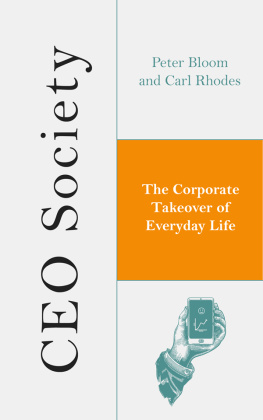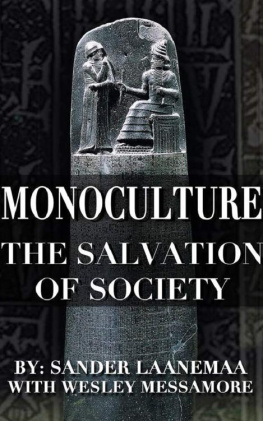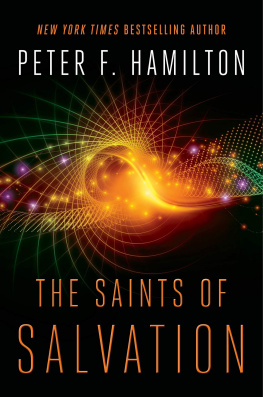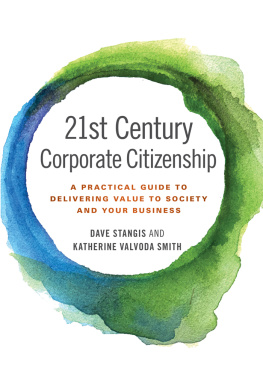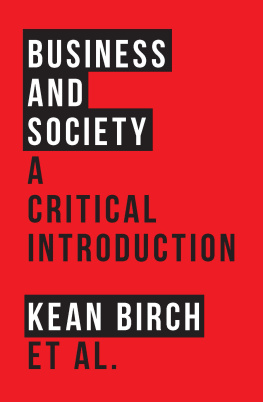
More praise for CEO Society
Many of todays CEOs purport to serve the public good. They are wealth takers re-branded as wealth creators. This book illuminates the dangers of CEO worship in an age of entrenched austerity.
Linsey McGoey, author of The Unknowers: How Strategic Ignorance Rules the World
In spite of the thorough and still growing critique of the leadership cult, CEOs proliferate in both private and public sectors. Let us hope that Bloom and Rhodes book will serve as an antidote.
Barbara Czarniawska, author of Cyberfactories: How News Agencies Produce News
Why do we pray at the altar of the celebrity CEOs? What are consequences of such disturbing worship? Bloom and Rhodes answer these questions, showing us the ugly side of our contemporary obsession and the price we collectively pay in the CEO society.
Alessia Contu, University of Massachusetts
This unique book sheds light on one of the most tragic paradoxes of contemporary life: Why do we celebrate neoliberalism, through todays cult of the CEO? Bloom and Rhodes explain our deep-seated attachments to ideologies that are not only flawed but also dangerous.
Kate Kenny, Queens University Belfast
Essential reading for anyone wanting to understand the contemporary fetishisation of corporate leadership. Rhodes and Bloom trace the rise of the cult of the CEO, mounting a strong defence of democracy in the face of this celebratory authoritarianism.
Chris Land, Anglia Ruskin University
About the authors
Peter Bloom heads the People and Organisations Department at the Open University, UK. His research critically examines the everyday practices of capitalism and democracy and their implications for work and life. Peters recent books are Authoritarian Capitalism in the Age of Globalization (2016) and The Ethics of Neoliberalism: The Business of Making Capitalism Moral (2017). Peters writing has also featured in The Washington Post , The Guardian , The Independent , The New Statesmen , The Week , The Conversation and Open Democracy among others.
Carl Rhodes is Professor of Organisation Studies at UTS Business School in Sydney, Australia. He has written widely on issues concerning the ethical and political dimensions of business and working life, including the recent Companion to Ethics, Politics and Organizations (2015, with Alison Pullen). Carl is a frequent commentator on business and politics on Australian and international television and radio. He regularly writes for the mainstream and independent press, where his articles can be found in The Guardian , New Matilda , The Conversation , Independent Australia and Open Democracy .
CEO Society
The Corporate Takeover of Everyday Life
Peter Bloom and Carl Rhodes

CEO Society: The Corporate Takeover of Everyday Life was first published in 2018 by Zed Books Ltd, The Foundry, 17 Oval Way, London SE11 5RR, UK
www.zedbooks.net
Copyright Peter Bloom and Carl Rhodes 2018.
The right of Peter Bloom and Carl Rhodes to be identified as the author of this work have been asserted by them in accordance with the Copyright, Designs and Patents Act, 1988
Typeset in Haarlemmer by seagulls.net
Index by Bronwyn Edds
Cover design by Emma J. Hardy
All rights reserved. No part of this publication may be reproduced, stored in a retrieval system or transmitted in any form or by any means, electronic, mechanical, photocopying or otherwise, without the prior permission of Zed Books Ltd.
A catalogue record for this book is available from the British Library
ISBN 978-1-78699-073-0 hb
ISBN 978-1-78699-072-3 pb
ISBN 978-1-78699-074-7 pdf
ISBN 978-1-78699-075-4 epub
ISBN 978-1-78699-076-1 mobi
Contents
On 9 November 2016, the world awoke to a new political reality. Donald Trump defied all expectations and was elected president of the United States of America, his victory reverberating the world over. For some it was cheered as a blow to a corrupt economic and political establishment, while for others it was feared as a dangerous embrace of racism, sexism, xenophobia and authoritarianism. What almost all agreed was that the future of liberal democracy and capitalism which only a decade before appeared unassailable was suddenly uncertain. It was not just Trump who had been questioning the status quo on the campaign trail. Although ultimately unsuccessful, the very existence of the explicitly democratic socialist campaign of Bernie Sanders in the earlier part of the US presidential race was for many a welcome injection of a progressive anti-establishment grassroots energy into an entrenched oligarchic and elitist American political system.
These events did not happen in a social vacuum. They were the capstone to a mounting populist attack on neoliberalism and its free market orthodoxy in both Europe and the United States. In the mid-2010s, Europe, once a bedrock of the international order, was rocked by massive political earthquakes. From the reinvigorated left arose Syriza in Greece, Podemos in Spain and Momentum in the United Kingdom, all of which directly challenged the dominant politics of austerity and financial rule. On the right, the British peoples 2016 vote to exit the European Union revealed the rise of a nationalist conservative revival that was anti-immigrant and protectionist. These politics, despite their fundamental ideological differences, started from a shared critique of the tyranny of corporate globalisation.
Perhaps the most obvious insight to be gained from these developments is that economic anxiety and inequality breed extreme reactions for both good and ill. Politicians, decision makers and the broader public, whether their politics lean left or right, seemed to have woken up to the dangers of a runaway neoliberalism. That the popularity of Trump arose as a response to this is especially astounding. The curious case with Trump is that while free market globalisation has been challenged from all sides, millions of Americans en masse voted to elect an ostentatiously super-rich CEO as their president. More generally, even as capitalism appears to be historically endangered, it remains the case that business executives (even the many times bankrupted ones) have a strong hold on the popular imagination as the people who can get things done. The irony is that the very personification of the establishment the ultimate insiders most responsible for our economic crises, political corruption and environmental destruction can be idolised and rendered powerful on the promise that they will fight an oppressive status quo. One may well ask why the heroic ideal of the CEO is continuing to thrive when by all moral and ethical rights its incumbents should have been fired once and for all.
Beyond the good and evil CEO
The CEO stands as one of contemporary societys most compelling and conflicted figures, as well as amongst its most famous. Present-day CEOs like Facebooks Mark Zuckerberg and Teslas Elon Musk, have joined business leaders of the recent past such as Apples Steve Jobs and The Body Shops Anita Roddick in becoming figures of envy and adulation. Nevertheless, depending on ones point of view, political persuasion and the vicissitudes of the news cycle, any particular CEO can be either lionised or loathed. They can be characterised at one and the same time as visionaries and realists; ethical innovators and moral hazards; generous benefactors and selfish hoarders; the very key to progress and the very obstacle to its achievement. They are, accordingly, both looked up to with admiration and despised with vehemence. CEOs appear as both a threat and a salvation for the woes of the modern world.
Next page
